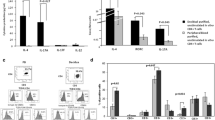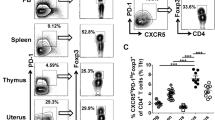Abstract
There is clear evidence to suggest that the maternal immune system during pregnancy can enhance or inhibit the development of the fetoplacental unit. Recent data support the view that some cytokines produced by both T cells and non-T cells (IL-3, GM-CSF, TGF-β, IL-4, IL-10), favor fetal survival and growth. In contrast, other cytokines, such as IFN-γ, TNF-β and TNF-α, can rather compromise pregnancy. Accordingly, we show here that T-cell clones generated from the decidua of women with unexplained recurrent abortion produced significantly lower concentrations of IL-4 than clones derived from the decidua of voluntary abortions or the endometrium of nonpregnant women. Thus, despite the complexity of the cytokine network, it appears that cytokines favoring the maintenance of fetal survival mainly belong to the Th2 pathway, whereas the failure of pregnancy rather associates with the predominance of Th1-type cytokines and/or the absence of Th2-type cytokines. Interestingly, we also found that, at least in vitro, progesterone promotes the preferential development of Th2-like cells and induces transient IL-4 production by established Th1 cells, whereas relaxin, another corpus luteum-derived hormone, mainly promotes the development of Th1-like cells. These data provide an excellent basis for investigating the relationship between the endocrine and the immune system in the regulation of the maternal-fetal interaction.
Similar content being viewed by others
References
Suthanthiran M, Strom TB: Immunobiology and immunopharmacology of organ allograft rejection. J Clin Immunol 1995;15:161–171.
Nickerson P, Steurer W, Steiger J, Zheng X, Steele AW, Strom TB: Cytokines and the Th1/Th2 paradigm in transplantation. Curr Opin Immunol 1944;6:757–764.
Mosmann TR, Coffman RL: Th1 and Th2 cells: Different patterns of lymphokine secretion lead to different functional properties. Ann Rev Immunol 1989;7:145–173.
Romagnani S: Lymphokine production by human T cells in disease states. Ann Rev Immunol 1994;12: 227–257.
Bulmer NJ, Johnson PM: Immuno-histological characterization of the decidual leucocytic infiltrate related to endometrial gland epithelium in early human pregnancy. Immunology 1985;55:35–44.
Raghupaty R, Singh B, Leigh GB, Wegmann TG: The ontology and turn over kinetics on paternal H-2K antigenic determinants on the allogeneic murine placenta. J Immunol 1981;127:2074–2079.
Vassiliadis S, Tsoukatos D, Athanassakis I: Interferon-induced class II expression at the spongiotrophoblastic zone of murine placenta is linked to fetal rejection and developmental abnormalities. Acta Physiol Scand 1994;151:485–495.
Vassiliadis S, Athanassakis I: Two novel colony-stimulating factor (CSF 1) properties: It post-transcriptionally inhibits interferon-specific induction of class II antigens and reduces the risk of fetal abortion. Cytokine 1994;6:295–299.
Hunt JS, Fishback JL, Andrews GK, Wood GW: Expression of class I HLA genes by trophoblast cells: Analysis by in situ hybridization. J Immunol 1988;140:1293–1299.
Ellis SA, Sargent IL, Redman CWG, McMichael AJ: Evidence for a novel HLA antigen found on human extravillous trophoblast and carcinoma cell line. Immunology 1986;59: 595–601.
Wegmann TG, Mosmann TR, Carlson G, Olingk O, Singh B: The ability of the murine placenta to absorb monoclonal anti-fetal H-2K antirody from the maternal circulation. J Immunol 1979;122:270–277.
Billington WD: Evidence for trophoblast immunogenicity in the induction of the maternal antibody formation in the murine pregnancy; in Cavaillon JM (ed), Les Cytokines. Paris, Masson, 1993, pp 371–383.
Zuckerman FA, Head JR: Murine trophoblast resist cell mediated lysis. I. Resistance to allospecific cytotoxic T lymphocytes. J Immunol 1987;139:2856–2859.
Wood GW: Is restricted antigen presentation the explanation for fetal allograft survival? Immunol Today 1994;15:15–18.
Arodlana-Panlilio MY, Schultz GA: Temporal and spacial expression of major histocompatibility complex class I H-2K in the early mouse embryo. Biol Reprod 1994;51:169–183.
Gendron R, Baines M: Infiltrating decidual natural killer are associated with spontaneous abortions in mice. Cell Immunol 1988;113:261–265.
Kinsky R, Delage G, Rosin N, Than MN, Hoffman M, Chaouat G: A murine model of NK cells mediated resportion. Am J Reprod Immunol 1990;23:73–77.
Drake BL, Head JR: Murine trophoblast can be killed by lymphokine activated killer cells. J Immunol 1989;143:9–13.
Chaouat G, Menu E, Athanassakis I, Wegmann TG: Maternal T cells regulate placental size and fetal survival. Regional Immunol 1988;1:143–148.
Chaouat G, Menu E, Clark DA, Dy M, Inkovski M, Wegmann TG: Control of survival in CBA X DBA/2 mice by lymphokine therapy. J Reprod Fertil 1990;89:447–458.
Chaouat G: Synergy of lipopolysaccharide and inflammatory cytokines in murine pregnancy: Alloimmunization prevents abortion but does not affect the induction of preterm delivery. Cell Immunol 1994;157: 328–340.
Chaouat G, Assal-Meliani A, Martal J, Raghupathy R, Elliott J, Mosmann T, Wegmann TG: IL-10 prevents naturally occuring fetal loss in the CBA X DBA/2 mating combination and local defect in IL-10 production in this abortion-prone combination is corrected by in vivo injection of IFN τ. J Immunol 1995; 154:4261–4268.
Hill JA, Haimovici F, Anderson DJ: Products of activated lymphocytes and macrophages inhibit mouse embryo development in vitro. J Immunol 1987;132:2250–2254.
Haimovici F, Hill JA, Anderson DJ: The effects of soluble products of activated lymphocytes and macrophages on blastocyst implantation events in vitro. Biol Reprod 1991; 44:69–75.
Berkowitz RS, Hill JA, Kurtz CB, Anderson DJ: Effects of products of activated leukocytes (lymphokines and monokines) on the growth of malignant trophoblast cells in vitro. Am J Obstet Gynecol 1988;158: 199–203.
Lin H, Mosmann TR, Guilbert L, Tuntipopipat S, Wegmann TG: Synthesis of Thelper 2-type cytokines at maternal-fetal interface. J Immunol 1993;151:4562–4573.
Wegmann TG, Lin H, Guilbert L, Mossmann TR: Bidirectional cytokine interactions in the maternalfetal relationship: Is successful pregnancy a Th2 phenomenon? Immunol Today 1993;14:353–356.
Delassus S, Continho GC, Saucier C, Darche S, Kourilsky P: Differential cytokine expression in maternal blood and placenta during murine gestation. J Immunol 1994;152: 2411–2420
Mosmann TR, Sad S: Immune regulation by T cell cytokine subsets: An expanding universe? Immunol Today 1996; in press.
Mowbry JF, In Gill TJ, Wegmann TG, Nisbet-Brown E (eds) Immunoregulation and Fetal Survival. Oxford, Oxford University Press, 1987, pp 300–308.
Da Silva JA, Spector TD: The role of pregancy in the course and aetiology of rheumatoid arthritis. Clin Rheumatol 1992;11:189–194.
Minkoff H, Nanda D, Menez R, Fikrig S: Pregnancies resulting in infants with acquired immunodeficiency syndrome or AIDS complex: Follow-up of mothers, children and subsequently born siblings. Obstet Gynecol 1987;69:288–291.
Weber DJ, Wolfson JS, Swartz MN, Hooper DC:Pasleurella multocida infections: Report of 34 cases and review of the literature. Medicine 1984;63:133–154.
Drutz DJ, Huppert M: Coccidioidomycosis: Factors affecting the host-parasite interaction. J Infect Dis 1983;147:372–390.
Watkinson M, Rushton DI: Plasmodial pigmentation of placenta and outcome of pregnancy in West African mothers. Br Med J Clin Res 1983;287:251–254.
Jameson EM: Gynecologycal and Obstetrical Tuberculosis. Philadelphia, Lea & Febiger, 1935.
Hill JA, Polgar K, Anderson DJ: T-helper 1-type immunity to trophoblast in women with recurrent spontaneous abortion. JAMA 1995;2/3: 1933–1936.
Parronchi P, De Carli M, Manetti R, Simonelli C, Sampognaro S, Piccinni M-P, Macchia D, Maggi E, Del Prete GF, Romagnani S: IL-4 and interferons (a and g) exert opposite regulatory effects on the development of cytolytic potential by Th1 and Th2 human T cell clones. J Immunol 1992;149:2977–2983.
Manetti R, Parronchi P, Giudizi MG, Piccinni M-P, Maggi E, Trinchieri G, Romagnani S: Natural killer stimulatory factor (NKSF/IL-12) induces Th1-type specific immune responses and inhibits the development of IL-4 producing Th cells. J Exp Med 1993;177:1199–1204.
Hsieh CS, Macatonia SE, Tripp CS, Wolf SF, O'Garra A, Murphy KM: Development of Th1 CD4+ T cells through IL-12 produced byListeria-induced macrophages. Sciences 1993;260:547–554.
Swain SL: IL-4 dictates T-cell differentiation. Res Immunol 1993;144: 616–620.
Maggi E, Parronchi P, Manetti R, Simonelli C, Piccinni M-P, Santoni-Rugiu F, De Carli M, Ricci M, Romagnani S: Reciprocal regulatory effects of IFN-g and IL-4 on the in vitro development of human Th1 and Th2 clones. J Immunol 1992; 148:2142–2147.
Seder RA, Paul WE, Davis MM, Fazekas de St Groth B: The presence of interleukin 4 during in vitro priming determines the lymphocyte-producing potential of CD4+ T cells from T cell receptor transgenic mice. J Exp Med 1992;176:1091–1098.
Daynes RA, Meikle AW, Araneo BA: Locally active steroid hormones may facilitate compartmentalization of immunity by regulating the types of lymphokines produced by helper T cells. Res Immunol 1991; 142:40–44.
Rook GAW, Hernandez-Pando R, Lightman SL: Hormones, peripherally activated prohormones and regulation of the Th1/Th2 balance. Immunol Today 1994;15:301–303.
Piccinni M-P, Giudizi MG, Biagiotti R, Beloni L, Giannarini L, Sampognaro S, Parronchi P, Manetti R, Annunziato F, Livi C, Romagnani S, Maggi E: Progesterone favors the development of human T helper cells producing Th2-type cytokines and promotes both IL-4 production and membrane CD30 expression in established Th1 cell clones. J Immunol 1995;155:128–133.
Manetti R, Biagiotti R, Giudizi MG, Piccinni M-P, Giannarini L, Sampognaro S, Parronchi P, Vinante F, Pizzolo G, Maggi E, Romagnani S: CD30 expression by CD8+ T cell producing Th2-type cytokines. Evidences for large numbers of CD8+CD30+ T cell clones in human immunodeficiency virus (HIV) infection. J Exp Med 1994; 180:2407–2411.
Del Prete GF, De Carli M, Almerigogna F, Daniel CK, D'Elios MM, Zancuoghi G, Vinante F, Pizzolo G, Romagnani S: Preferential expression of CD30 by human CD4+ T cells producing Th2-type cytokines. FASEB J 1995;9:81–86.
Ito K, Watanabe T, Horie R, Horie M, Shiota S, Wakamura S, Mori S: High expression of the CD30 molecule in human decidual cells. Am J Pathol 1994;145:276–280.
Szekeres-Bartho J: Immunosuppression by Progesterone in Pregnancy. Boca Raton, CRC Press 1992.
Szekeres-Bartho J, Reznikoff Etievant MF, Varga P, Pichon MF, Varga Z, Chaouat G: Lymphocyte progesterone receptors in normal and pathological human pregnancy. J Reprod Immunol 1989;16:239–247.
White A, Wang MW, King IS, Heap RB: Blotinylated anti-progesterone monoclonal antibodies specifically target the uterine epithelium and block implantation in the mouse. J Reprod Immunol 1992;21:127–138.
Chaouat G, Menu R, Kinski R, David F, Wegmann TG: Immunoregulatory role of the placenta. J Immunol Immunopharmacol 1990;10: 45–50.
Bryant-Greenwood GD, Schwabe C: Human relaxins: Chemistry and biology. Endocr Rev 1994;15:5–26.
Author information
Authors and Affiliations
Rights and permissions
About this article
Cite this article
Piccinni, MP., Romagnani, S. Regulation of fetal allograft survival by hormone-controlled Th1- and Th2-type cytokines. Immunol Res 15, 141–150 (1996). https://doi.org/10.1007/BF02918503
Issue Date:
DOI: https://doi.org/10.1007/BF02918503




